Autumn has officially arrived in France. The clocks have gone back, the air is cooler, and whilst grey, rainy days have set in, we can still look forward to the occasional burst of sunshine. November may be one of the shorter months, but before preparations for the end-of-year festivities begin, there are several important matters to keep in mind
Financial update November 2025 | France
By Katriona Murray-Platon
This article is published on: 9th November 2025

Although the taxe d’habitation has become a thing of the past for most French residents, it still applies to owners of second homes in France. Over four million households are liable for either the Taxe d’Habitation sur les Résidences Secondaires (THRS), the Taxe sur les Logements Vacants (TLV), or the Taxe d’Habitation sur les Logements Vacants(THLV).
The Taxe d’Habiation statements should now be available in your online account on impots.gouv.fr, where you will also find the payment details and deadlines.
On 25th October, the French deputies voted to amend the draft finance bill that was proposing to freeze the income tax rates, instead voting in favour of re-establishing indexation in line with inflation which increases current tax bands by 1.1%. Below is a table showing the 2025 thresholds compared with the proposed thresholds for 2026.
| 2025 income tax thresholds | Proposed tax thresholds (increased by 1.1%) for 2026 | Income tax rate |
| Under €11,497 | Under €11,623 | 0% |
| Between €11,498 and €29,315 | Between €11,624 and €29,637 | 11% |
| Between €29,316 and €83,823 | Between €29,638 and €84,745 | 30% |
| Between €83,824 and €180,294 | Between €83,746 and €182,277 | 41% |
| Over €180,295 | Over €182,278 | 45% |
Once the finance law is officially adopted at the end of the year, I will confirm these thresholds.
If you are subject to Wealth Tax on Property (IFI) and the amount due is €300 or less, this must be paid by 17th November by cheque, cash or bank card or by the 22nd November if you pay online. If the amount is more than €300, it must be paid online via the impots.gouv.fr website.
By now, you should have received your income tax statement and paid tax due. If you have discovered any errors or miscalculations, please correct them as soon as possible as after 3rd December 2025 you will no longer be able to submit an amended tax return on the impots.gouv.fr website; any corrections after this date must be submitted in paper form.
If you have a PEL account which was opened between 2011 and 2015, your bank will automatically close it and transfer the funds to another savings account. PELs opened since 1st March 2011 can be held for a maximum of 15 years, whereas the PELs opened before this date can remain open indefinitely. According to the Banque de France, the average balance of a PEL account is €25,017, with around 12% of such accounts exceeding the maximum capital limit of €61,200. These accounts are not term accounts and should only be used if you plan to purchase a property or carry out renovations to your property.
If you do seasonal lettings, you will have received an email from the tax office reminding you that the tax rules have changed in 2025. For “meubles de tourisme non classés” if your income in 2023 and 2024 was more than €15,000 you can no longer stay as micro-BIC. The income that you received will be under the “régime réel” and will require the assistance of an accountant. You should contact your tax office for more information.
Urssaf also sent an email to remind those who earned over €23,000 from their season lettings that they have to pay social security contributions on this income and not social charges like other landlords. Depending on your turnover, you can opt for the micro-social regime at either 21.2% (for meublés de tourisme non classés) or 6% (for meublés de tourisme classés). From 2027, website-based business as Airbnb and Arbitel will take the social contributions directly at source.
If you have any questions on the above or any other matters, please do get in touch. I am available for online meetings or face to face meetings throughout November, so if you have any questions about your finances, please do contact me to arrange a free, no obligation, meeting.
Financial Tips in Spain – November 2025
By Chris Burke
This article is published on: 1st November 2025
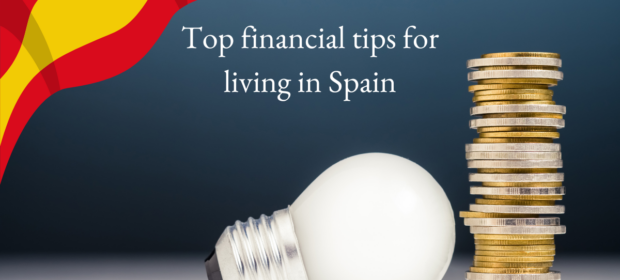
I often hear from people who are used to tax-efficient savings and investments in their home country (for example, UK ISAs) and want to find the same here in Spain. Immediately, I explain two key things:
- Unless you qualify for a specialist tax regime such as The Beckham Law, you will generally pay more tax living in Catalonia (and Spain in general) — we pay to live here (and most would agree it’s worth it!).
- It’s not easy to get the right advice when it comes to setting yourself up tax-efficiently in Spain — covering everyday income taxes, deferring and mitigating savings/investment tax, and avoiding common pitfalls that can lead to problems with the Spanish tax authorities.
When arranging your finances, there are three professionals you should have on your side — and in this order:
1. Tax Adviser / Lawyer
They’ll explain, implement, and advise on the best way to set yourself up from a tax perspective in Spain. This is your starting point. Once you’re resident, the “tax clock” starts ticking — so it’s crucial to get it right from the outset.
2. Accountant (Gestor)
They ensure you declare what you should, claim what you can, and stay compliant with Spanish tax obligations. Remember: in Spain, you’re often considered “guilty until proven innocent” — bank accounts can be frozen or assets seized until you legally prove otherwise, which can take years.
3. Financial Adviser
A good financial adviser will first make sure the above two areas are in order. Then, they’ll take the time to understand your situation, your questions and priorities, and build a tax-efficient investment strategy that matches your goals and comfort with risk. They’ll also ensure you’re administratively organised — for example, having the right Will.

Each of these professionals can save you thousands of euros in Spain.
The first two focus mainly on income tax, whilst my role as a financial adviser is to help you grow and preserve your wealth — ensuring that when you or your heirs access it, it’s done as tax-efficiently as possible.
Tax-Efficient Investing in Spain
If you’re resident (or becoming resident) in Spain, here are some key points and strategies to be aware of:
1. Taxation for Residents
If you are tax resident in Spain (over 183 days here, or your “centre of interests” is in Spain), you’re taxed on your worldwide income and gains.
- Investment income (dividends, interest, and capital gains) falls under the savings tax scale:
• 19% up to €6,000
• 21% from €6,000–€50,000
• 23% from €50,000–€200,000
• 26–28% above that
- Wealth tax (patrimonio) applies in many regions — some exempt it, but Catalonia it is not.
- Tax-free wrappers from abroad (like UK ISAs) are not recognised as tax-free in Spain.
- Non-compliant investments can lead to worse tax treatment and extra reporting (e.g., Modelo 720).
2. Key Tax-Efficient Investment Structures
Spanish-Compliant Investment Bond (SCIB)
A life-assurance based investment bond recognised by Spanish authorities.
Benefits include:
- Growth inside the policy rolls up tax-free (no annual taxation).
- Withdrawals are taxed only on the gain portion, not the full amount.
- May reduce reporting obligations (like Modelo 720).
- Can assist with inheritance planning.
Important: Ensure it’s a Spanish-compliant product — otherwise, you lose these benefits. While it offers tax deferral, you’ll still pay savings income tax when you withdraw gains (unlike a UK ISA).
Holding Company / ETVE Regime
For those with corporate structures, the Entidad de Tenencia de Valores Extranjeros regime can be highly tax-efficient.
- Dividends and gains from foreign subsidiaries may be 95% exempt from corporate tax.
- Dividends to non-residents can often be distributed tax-free. This is generally for higher-net-worth individuals or corporate setups.

3. Practical Strategies & Top Tips
- Use only Spanish-compliant investment products if you’re resident.
- Time your withdrawals to stay in lower tax bands.
- Consider your region’s tax regime (e.g., wealth tax exemptions vary).
I am here to help you get organised and take those financial worries away. If you would like to discuss any of the above topics in more detail, or you would like to have an initial consultation to explore your personal situation, you can do so here.
Click here to read independent reviews on Chris and his advice.
Hindsight is not always a wonderful thing
By Jeremy Ferguson
This article is published on: 28th October 2025

Especially when it comes to retirement.
I was really interested to read an article recently published in the UK press about regrets many pensioners have when they do eventually retire.
The number one regret was not saving enough early on in their lives, with many retirees wishing they had started saving into their pensions earlier, or having increased the amount they paid into their pensions when their incomes were higher later on in their careers.

Next unsurprisingly was under-estimating how much you’ll eventually need to retire with. The common issue in this regard was being overly optimistic about how secure their retirement finances would be given longevity, inflation, healthcare costs, etc. In all fairness, all of these factors are very hard to predict over the longer term.
One thing we now know is that the advances in medical treatments and care are resulting in longer life expectancy, and a better physical well being. All of this means we are living longer and being much more active in retirement, both of which cost more.
The importance of actively managing pension arrangements was again largely under estimated, with many retirees wishing they’d made clearer plans earlier. For example, when to retire, where they may be retiring and what sort of lifestyle they wanted. As these ‘wants’ changed during their younger years leading up to retirement, many people simply didn’t adjust their pensions accordingly.
Inevitably this is easier said than done, making it one of the most difficult decisions to get right, because of course it’s almost impossible. Some retirees feel they were too cautious with their money in their younger years, with others maybe enjoying life a tiny bit too much and then finding out they either couldn’t enjoy retirement fully because they hadn’t contributed enough, or conversely finding out their pension income far exceeded their needs in retirement.
Needless to say that if you are reading this and you have already retired, then these observations may all be a little too late. However, many people I meet after they have moved to Spain have retired quite early in life and are not yet drawing on their pensions. In these cases, there is still a lot you can do, particularly by way of managing these pension funds as effectively as possible. Ie Maybe the charges can be reduced or the investment strategy can be improved? Also, what about the tax position when you do start to draw down – understanding this and making sure it’s as tax efficient as possible can make a big difference.

Retirement planning is also not always about your pensions, it is often about managing your savings as well, and many people I speak to come here with funds they didn’t plan to have accumulated as a result of selling their UK property, which had increased impressively in value over the years.
If managed correctly and invested in the right way, these funds can in many cases be used to substitute pension income and help you enjoy living here in Spain.
If this is you, then please feel free to get in touch so we can take a good look at your current situation and if relevant consider the available options as to how best to manage things going forward.
Le Tour de Finance in France
By Spectrum IFA
This article is published on: 23rd October 2025
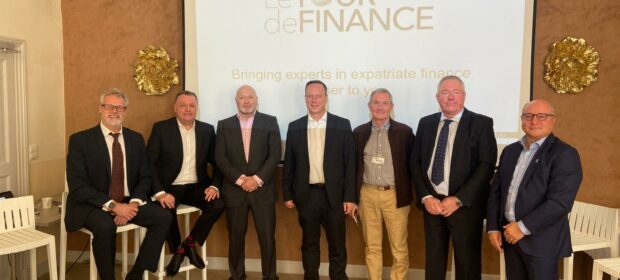
Thinking of moving to Europe… or already living the expat life in France?
Welcome to Where Money Talks.
Le Tour de Finance brings together expats, advisers and finance professionals for relaxed, practical and interactive sessions on tax and financial planning in France. The event is designed for people who want to live well, feel secure and plan smartly while navigating French-resident tax regimes, Assurance Vie, pensions, investment markets and estate planning.
Two exceptional venues, two great days of connection
Over the course of our recent tour we gathered over 70 participants across two beautifully located events. Day one took place at Château Val Joanis near Pertuis (Vaucluse) — nestled in the Luberon region, a scenic estate of vines, olive trees and renowned terraced gardens.
Day two followed at Château de la Bégude in Valbonne on the Côte d’Azur, a 17th-century manor within a peaceful golf-estate setting between Valbonne and Opio.
The atmosphere throughout was warm and interactive: in both venues attendees were able to enjoy breakout conversations, mingle in the gardens, and engage in meaningful Q&A with the presenters. More than just formal lectures, the days offered an opportunity to ask real-life questions, share experience with fellow expats, and take away actionable next-steps in a friendly setting.
 Speakers & professional insight
Speakers & professional insight
We were pleased to host a strong panel of trusted advisers and finance practitioners including representatives from The Pru, The Spectrum IFA Group, Currencies Direct, Brewin Dolphin and Novia Global. These experts guided discussions through key issues such as tax-efficiency for French-resident expats, UK/France pension interfaces, the role of Assurance Vie, foreign exchange and currency strategies, investment markets and legacy/estate planning. Having all these viewpoints in one place meant attendees could begin to build a rounded understanding – rather than piecemeal advice.
Living in France as an expat — why planning matters
Living abroad in France brings many rewards – lifestyle, weather, culture, international community, but also distinct financial and tax responsibilities. Becoming tax-resident in France triggers a range of rules on income, inheritance, assets and investments. Without careful planning, the complexity can lead to missed opportunities or unintended liabilities. Time and again during the event we heard how proactive planning with professionals makes the difference: understanding the French tax treaty framework, choosing the right investment wrapper (such as Assurance Vie), considering currency exposure, and aligning UK/France pensions and inheritance.
Equally important is the personal dimension: being able to relax, knowing your financial affairs are in order, and being part of a network of like-minded expats. That sense of community and shared experience was very evident across both days of Le Tour de Finance.
Thank you & next steps
A heartfelt thank-you to everyone who attended and to our presenters for their clarity and engagement. If you couldn’t join this round, keep an eye on our website for future events, and feel free to get in touch to explore how tailored advice might support your personal expat financial journey. Because when you’re living abroad, planning ahead matters – and getting the right help makes all the difference.
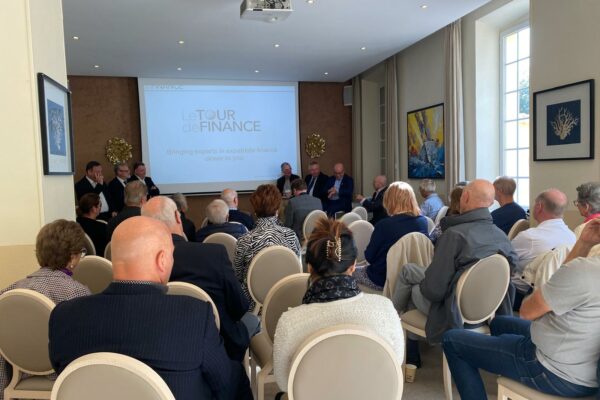
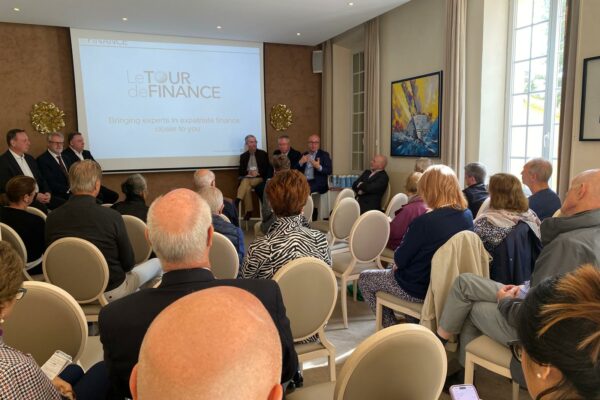
Can I Pass On My Investments Tax-Efficiently in Spain?
By Matthew Green
This article is published on: 18th October 2025
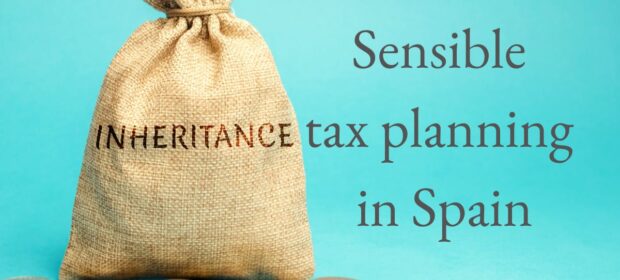
Moving to Spain gives you more than just a better lifestyle — it offers a fresh perspective on what really matters.
For many expats, that means not only enjoying their wealth today, but ensuring it’s passed on efficiently to loved ones tomorrow.
But here’s the catch: Spain’s inheritance and gift tax system works very differently from what most expats are used to in their home countries. And without the right planning, your family could end up facing an unnecessary and unexpected tax bill.

Understanding How Inheritance Works in Spain
In Spain, inheritance tax (Impuesto sobre Sucesiones y Donaciones) is paid by the beneficiary, not the estate.
That’s often the first surprise for newcomers — it’s your spouse, children, or other heirs who pay the tax, rather than your estate before distribution.
The amount payable depends on:
- The relationship between the deceased and the beneficiary (spouses and children generally receive the biggest allowances)
- The value of the inheritance
- The region of Spain you live in — because each autonomous community (like Valencia or Madrid) sets its own allowances and reductions
For example, Madrid currently offers one of the most generous regional allowances, with reductions of up to 99% for close family members. Valencia, on the other hand, provides smaller deductions — which can make a significant difference to your family’s eventual tax exposure.
Structuring Your Investments Can Make a Big Difference
The way you hold your assets determines how smoothly — and efficiently — they can be passed on. Investments in a Spanish tax-compliant bond can offer a number of key advantages when planning for succession:
- You retain full control of your investment during your lifetime
- You can name multiple beneficiaries, who inherit directly without the need for probate delays
- The bond’s structure allows for efficient transfer of value — avoiding the administrative complexity that often comes with overseas holdings
- Beneficiaries may receive significant tax advantages, depending on your region of residence
In short, compliant structures help your heirs inherit assets that are clean, locally compliant and immediately accessible, without triggering unnecessary tax consequences.

Avoiding Common Pitfalls
Many expats unintentionally make things more complicated by:
- Holding UK ISAs, investment accounts, or offshore funds that aren’t recognised under Spanish law
- Keeping property or assets in personal names rather than through efficient vehicles
- Failing to review beneficiary nominations after moving to Spain
These issues can create double taxation risks, delays or even cause assets to fall outside your heirs’ allowances. A simple review of your portfolio through the lens of Spanish succession law can often fix these risks before they become costly.
Peace of Mind for You and Your Family
Effective planning is about more than saving tax — it’s about clarity and peace of mind. Knowing that your wealth will transfer smoothly and efficiently to the people you care about is one of the greatest gifts you can leave behind.
Whether your goal is to ensure your spouse is financially secure, or to pass on assets to your children in the most tax-efficient way possible, a little forward planning today can make all the difference tomorrow.
Final Thought
If you’ve chosen to make Spain your long-term home, your financial plan should reflect that. Local advice can help you align your investments, pensions, and estate planning with Spanish law — so your wealth stays protected across generations.
If you’re an expat living in Valencia, Madrid, or elsewhere in Spain, and you’d like to understand how to structure your assets for efficient inheritance and succession, I can help.
We’ll review your existing arrangements and identify ways to reduce potential inheritance tax exposure, simplify the transfer of assets, and ensure your loved ones are properly protected.
Get in touch for a no-obligation consultation to discuss your personal situation and learn how to build a clear, tax-efficient legacy plan for your family.
Financial Clarity for Expats in Spain
By Matthew Green
This article is published on: 16th October 2025

The Expat’s Guide to Building Wealth in Spain
What Catches most Expats Off Guard
When you move to Spain, the dream is clear: sunshine, a slower pace, and more time to enjoy life. But for many expats, the reality of managing money here soon brings a new challenge — understanding how the Spanish tax system treats your investments.
In the UK or elsewhere, you might have built wealth using ISAs, premium bonds, or investment portfolios with little thought for cross-border implications. But once you become a tax resident in Spain, those same structures can start working against you rather than for you.

New Life, A New Set of Rules
One of the biggest surprises for newcomers to Spain is that Spain taxes your worldwide income and gains — not just what’s earned here. That includes dividends, interest, and even growth within investment funds.
It’s easy to assume that investments left “back home” can be ignored, but in reality, the Spanish tax authorities (Hacienda) expect full reporting of your global assets.
These are the areas where I see expats run into problems most often:
- Selling shares or funds that trigger capital gains tax at 19–28%
- Holding money in non-compliant offshore accounts
- Missing annual reporting obligations on overseas assets (Modelo 720/721)
Smarter, More Efficient Options are Available to You
Spain offers legitimate, tax-efficient investment structures designed specifically for residents. One of the most effective is the Spanish tax-compliant investment bond.
Here’s why so many expats in Valencia and Madrid are switching to these structures:
- Your money still grows through diversified investments (funds, equities, etc.)
- Growth inside the bond is tax-deferred — you only pay tax when you withdraw
- Withdrawals are treated proportionally, so only a small part is taxable
- No annual reporting required on the underlying investments
- It simplifies wealth management — one structure, one report, all compliant with Spanish law
For example, if your investment grows 5% in a year and you take a small withdrawal, only a fraction of that amount is taxable – not the full sum. Compare that to a General Investment Account, where every sale or fund switch could trigger tax immediately.
Building Your Wealth with Peace of Mind
The goal isn’t just to save tax — it’s to grow wealth sustainably, with peace of mind.
By using compliant structures, you can:
- Avoid unnecessary annual tax drag on your investments
- Allow your capital to compound over time
- Keep your financial reporting simple and transparent
And when it comes to retirement planning or accessing your UK pension, having your investments structured correctly in Spain makes a world of difference to how much you actually keep.

Why Personal Advice Matters
Every expat’s situation is unique — from how income is generated, to where assets are held, to whether a move is permanent or temporary.
That’s why getting regulated local advice matters.
The Spanish system can be generous when you plan properly – but unforgiving if you don’t.
So before you make any investment or draw from your pension, take a moment to review your setup. The right structure today can save you thousands over the years ahead, and keep your finances aligned with the lifestyle you came here to enjoy.
Spain rewards those who plan ahead. Take the time to understand your options, and you can enjoy the life you moved here for – without letting unnecessary taxes eat into what you’ve built.
If any of this resonates with your situation, the best next step is a conversation.
About Matthew
Matthew Green is a UK-qualified financial adviser based in Spain, working with British and international expats across Valencia, Madrid, and the wider Costa Blanca region.
He is a member of The Spectrum IFA Group — one of Europe’s leading independent financial advisory firms for expatriates — and is regulated to provide cross-border financial advice.
Matthew’s approach is straightforward: understand your life first, then build a plan around it. No jargon, no pressure, no one-size-fits-all solutions.
What to Expect:
It starts with a conversation — usually 20 to 30 minutes. There’s no preparation needed on your part. We’ll talk about your situation, what’s on your mind, and whether there are areas where I can help.
There’s no cost, no obligation, and no pressure. The goal is simply to give you a clearer picture of where you stand.
Spectrum IFA begins Employee Ownership for a Sustainable Future
By Spectrum IFA
This article is published on: 14th October 2025
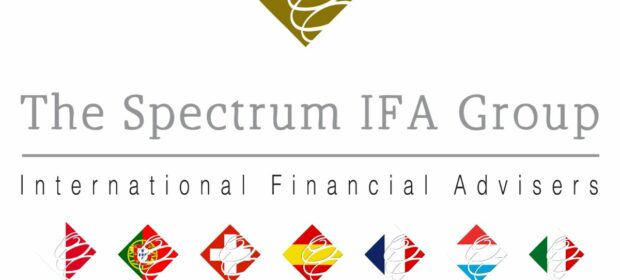
Empowering People, Ensuring Continuity, and Deepening Commitment to Clients
At The Spectrum IFA Group, our success has always relied on our people, their expertise, dedication, and a shared belief in doing what is best for our clients. As a firm founded on trust, transparency and building long-term relationships, we recognise that sustainable growth depends not only on sound financial advice but also a solid grounding in joint ownership and responsibility.
Since its inception, Spectrum has aspired to share company ownership with its advisers and staff. Establishing a clear succession plan is essential, not only to ensure business continuity but also to provide long-term security for our advisers, employees, and most importantly, our clients.
Today, Spectrum’s advisers and staff collectively hold over 15% of the company’s share capital. This initiative reflects our belief that those who contribute daily to looking after our clients’ interests should also participate in the company’s growth. In 2026, Spectrum plans to increase employee and adviser equity participation to approximately 30%. Our longer-term intention is for advisers and employees to own 48% of the business, with the remaining 52% retained by the founders.
This approach demonstrates our commitment to creating a resilient, people-focused organisation where everyone has a vested interest in delivering exceptional advice and service. By aligning ownership with those who directly support our clients, we are securing our longevity whilst embedding the long-term continuity of relationships that help define our unrivalled service standards.
At Spectrum, we view this as more than simply an exercise in restructuring company ownership – it reflects of our core values. We are building an organisation that empowers people, rewards dedication, and safeguards the future security of our clients, advisers, and employees alike. Together, we are shaping a stronger, more sustainable Spectrum team for generations to come.
Modelo 720 Spanish Tax Form
By Jett Parker-Holland
This article is published on: 13th October 2025
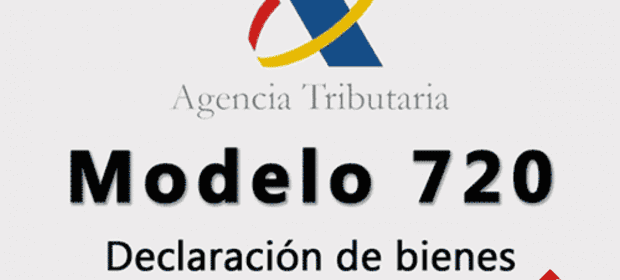
When people move to Spain, they often expect challenges around property or residency, but one of the biggest surprises comes from the tax office. After settling in, most people become accustomed to the Spanish tax system; however, one common pitfall that British expats encounter is the requirement for a single tax reporting form, known as Modelo 720.
Importantly, this is not a tax bill; it is a declaration, but failing to address it correctly can still result in hefty penalties and unnecessary stress.

The Modelo 720 is an annual information return that Spanish tax residents must file if they hold certain assets abroad worth more than €50,000 in any of three categories: bank accounts, investments, and property. Once filed, it does not need to be submitted again unless your foreign-held assets increase by more than €20,000, or your wealth in another category exceeds the €50,000 threshold. It aims to give the Spanish tax authorities a clear picture of your worldwide wealth.
Importantly, the form itself does not create a tax liability, but it can leave you open to scrutiny, which is where the risk lies. Failure to declare or even minor errors can lead to fines, backdated tax assessments, and interest charges. Once you’re on Hacienda’s radar, future scrutiny tends to increase, which is a headache nobody wants when settling into life in Spain.
Many expats worry that the cash and investments they have held in the UK may pose a potential issue with the Modelo 720, and that failing to declare in previous years may prevent them from doing so now. The good news is that by structuring your finances in advance, you can avoid this problem altogether. Certain Spanish-compliant investment bonds are not classed as foreign assets for Modelo 720 purposes, meaning you don’t need to declare them. For those anxious about declaring, this can be a great opportunity to structure your wealth so that it does not need to be declared, thereby avoiding ongoing scrutiny.
Beyond avoiding declaration, a bond allows for tax-deferred growth within the bond, meaning that your wealth can continue to collect interest and benefit from favourable tax treatment on withdrawals. Spanish-compliant bonds are not just about avoiding taxes or declarations; they are about ensuring compliance with Spanish regulations. For many of my clients, transferring assets into a compliant bond is the single most significant step they take to streamline their financial life in Spain.

Modelo 720 may seem like a minor formality, but mishandling it can turn into an expensive problem. By structuring your wealth effectively, you can reduce the risk of fines while also gaining ongoing tax efficiency and estate planning benefits. If you are already living in Spain or planning a move, now is a good time to review your arrangements.
A Spanish-compliant product is (almost) a prerequisite for an expat investor in Spain; it is the cleanest way to stay on the right side of Hacienda while keeping your money working hard for you.
As a Chartered Wealth Manager with a master’s degree in Investment Management, I specialise in helping British expats in Spain manage pensions, investments, and tax-efficient structures. With years of experience advising across both the UK and Spain, I focus on making cross-border finances simple, compliant, and effective for the long term.
If you would like a confidential review of your situation or would like to explore your options, please don’t hesitate to contact me. Proper planning today can save you a great deal of time, money, and stress tomorrow.
Smart investing for expats in Spain
By Chris Burke
This article is published on: 13th October 2025

Regular saving & investing for Expats in Spain: A New Way to Build Your Future Wealth
For many of my clients here in Catalonia and across Spain, their wealth is locked away in their home/property. It’s a comforting form of security, however most people understand the need to make their surplus money and savings work for them —as the years are passing and the need to plan for future expenses and retirement are becoming ever more important.
But here’s the challenge:
If you live in Spain, your options for tax-efficient long-term saving are extremely limited — unlike in the UK, where private pensions allow contributions of up to £60,000 per year with valuable tax relief.
So, what can you do if:
- You don’t have a large lump sum to invest right now, but
- You do have a monthly disposable amount that you could commit toward your financial future?
Until recently, the answer wasn’t encouraging. Most products available locally offered poor returns, high fees, and were designed to benefit the banks or institutions more than the investor.
That’s changed.
Today, we have a cost-efficient investment strategy that allows our clients to start with a modest initial amount and then add to it monthly — a plan that truly works in your favour.
Here’s why it’s such a powerful approach and can increase your wealth allowing your money to pay for future life goals:

1. Compounding Growth: Your Money ‘Making’ Money
When you invest regularly, your returns begin to generate returns — that’s the magic of compound interest.
For example:
- Initial investment: €50,000
- Monthly contribution: €1,000
- Average annual return: 6%
Timeframe: 10 years
At the end of that period, your total balance could exceed €254,850.
The rule of 72 is a handy guide here: divide 72 by your annual return (72 ÷ 6 = 12 years), and you’ll see how long it takes to double your money. The longer you invest, the more powerful compounding becomes.

2. Smoothing Out Market Volatility (Dollar/Euro-Cost Averaging)
By investing a fixed amount every month, you buy more when prices are low and fewer when they’re high — automatically reducing your risk.
This strategy, known as dollar/euro-cost averaging, helps take the emotion out of investing and smooths out short-term market swings.
Over time, it leads to a lower average cost per unit and more stable growth.

3. Time in the Market Beats Timing the Market
Even professional investors can’t consistently predict when to buy or sell.
What matters most is staying invested — because missing just a few of the market’s best days can dramatically impact your long-term returns.
A disciplined monthly investment keeps you in the game and lets you capture long-term market growth without the stress of guessing when to act.

4. Builds a Strong Saving Habit
Treat your monthly investment like a bill — a payment to your future self.
This simple mindset creates powerful financial discipline and ensures you’re always moving closer to your goals, even when life gets hectic.

5. Your Money Working Harder — and Smarter
Regular investing means your money is always working for you.
Through dividends, interest, and capital growth, your returns compound over time — accelerating your wealth creation.

6. Protecting Your Wealth Against Inflation
Cash sitting in a bank account is losing value every year due to inflation.
Investing in assets such as stocks, bonds, or diversified funds gives your money a real chance to outpace inflation and grow in real terms.

7. Building Financial Independence
Consistent, long-term investing helps you create assets that generate income and give you freedom.
Whether your goal is a secure retirement, helping your children with education, or achieving financial independence, this strategy is designed to get you there — steadily and confidently.
In Summary
You don’t need a fortune to start — just commitment, consistency, and a smart structure.
Our investment strategy gives you the flexibility to start small, save a sizeable monthly disposable amount, and build meaningful wealth over time — without the high costs or complexity of traditional financial products.
If you’re an expat in Spain ready to make your money work harder for your future, now is the time to act.
Ready to see how this could work for you?
Get in touch for a confidential, no-obligation conversation about building your financial future in Spain – NOTE, a minimum saving amount of €1,000 per month applies.
If you would like to have an initial consultation to explore your personal situation, you can do so here.
Click here to read independent reviews on Chris and his advice.
The Beckham Law advantage
By Chris Burke
This article is published on: 9th October 2025

How expats in Barcelona/Spain can save, invest, reduce future taxes and build wealth smartly
Barcelona/Spain continues to attract top international talent — entrepreneurs, digital professionals, and executives who want to enjoy life in one of Europe’s most vibrant cities while advancing their careers. But moving to Spain comes with financial questions:
How can you structure your income efficiently, save for the future, and make your money work harder for you?
Enter the Beckham Law — a powerful tax regime that, when used strategically, can form the foundation for long-term wealth building.

What Is the Beckham Law?
Originally introduced in 2005 (and famously used by David Beckham during his time at Real Madrid), the Beckham Law — officially known as the Special Expat Tax Regime — allows qualifying foreign workers in Spain to be taxed as non-residents for a period of up to six years.
That means:
- You pay 24% tax on Spanish employment income up to €600,000 (€47% above that).
- Foreign income and gains are exempt — in other words, you’re not taxed in Spain on your worldwide income.
For professionals relocating to Barcelona/Spain, that’s a huge opportunity.
It provides a window of time to optimise your finances, save aggressively, and invest smartly before you transition into the standard Spanish tax system/move elsewhere.

The Challenge: Saving and Investing in Spain
While the Beckham Law provides tax advantages on income, the options for medium/long-term saving and investing in Spain are limited — especially compared to the UK or other countries with flexible private pension systems.
Spanish banks are generally perceived to offer higher-cost products and traditional pension plans have minimal contribution and tax advantages.
So, what can you do if you want to make the most of your time under the Beckham regime and then very importantly make sure you are highly tax efficient for when it ends and you either stay in Spain or leave?

The Opportunity: Strategic International Investing
This is where smart financial planning makes all the difference.
I help clients in Barcelona/Spain build international investment structures that are:
- Tax-efficient under the Beckham regime,
- Flexible, allowing monthly or lump-sum contributions,
- Transparent and low-cost, focused on long-term growth rather than bank fees,
- And fully compliant with Spanish and international regulations.
This approach allows you to save regularly and grow your capital while enjoying the tax benefits available to you during your time in Spain.

How Regular Investing Builds Wealth
You don’t need to start with a fortune — consistency is what counts.
Here’s a simple example of what steady investing can achieve:
- Initial investment: €50,000
- Monthly contribution: €1,000
- Average annual return: 6%
- Duration: 10 years
At the end of that period, you could have over €254,850 — thanks to the power of compound growth. Regular saving smooths out market volatility, creates financial discipline, and puts time on your side.
Why Act Now
The Beckham Law is temporary — and the clock starts ticking the day you qualify.
The earlier you begin saving and investing during your residency, the more you can take advantage of the reduced tax burden and compounding returns.
Once your six-year window closes, your tax position changes — so using that time effectively can make a massive difference to your long-term wealth.

Your Financial Strategy in Barcelona
If you’re an international professional living or working in Barcelona, your financial situation is unique — and it deserves a tailored plan.
With the right structure in place, you can:
- Enjoy the benefits of the Beckham Law,
- Build investments that grow efficiently,
- Protect your assets,
- And lay the foundation for lasting financial independence.
Tax Efficient strategy
When on the Beckham Law you have almost a ‘once in a lifetime’ opportunity to get financially organised, reduce future taxes and mitigate/eradicate profits on current gains, potentially increase wealth substantially and set yourself up for the rest of your life financially – You just need the right advice, financial partner and strategy to help you do this, someone with years of experience helping clients achieve this.
Ready to make the most of your time under the Beckham regime?
I help expats in Spain take control of their finances — with transparent advice, efficient investment strategies, and a long-term view of wealth creation.



